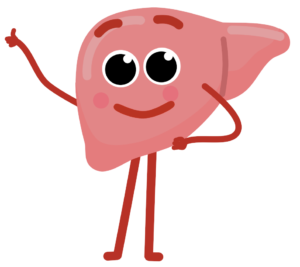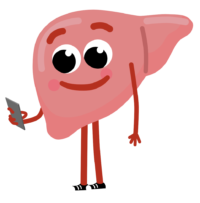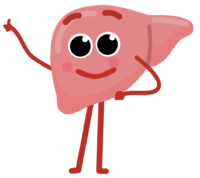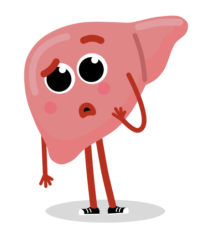Why your liver is important

Just about everything you eat and drink passes through your liver. Even chemicals that touch your skin and toxins that you breathe in pass through your liver.
Your liver has many important jobs to keep your body working at its best. Among these important jobs are to remove toxins from your body and transform nutrients from food into energy. However, a damaged liver cannot do these jobs properly, so it is important to keep your liver healthy.
Liver facts
- Largest internal organ
- On the right-hand side of your torso, behind your ribs
- Can repair itself and create new healthy liver tissue
- Liver cells break down fats and produce energy
- 1.5 litres of blood flows through your liver every minute
Liver disease can affect anyone
There are many liver diseases that can affect both adults, and children. Those at risk of liver damage include people who:
- Are overweight or obese and have a fatty liver
- Drink too much alcohol
- Have an undiagnosed or untreated viral infection such as hepatitis B or hepatitis C
- Have a problem with their immune system that leads to liver disease
- Are born with liver disease
What is hepatitis?

Hepatitis means inflammation of the liver. An inflamed liver can sometimes be enlarged or swollen. Causes of liver inflammation may include viral hepatitis such as hepatitis B or hepatitis C, alcohol, drugs, or fat. Sometimes there may be a combination of these causes.
Looking out for symptoms
A damaged liver can continue functioning over a long period without showing symptoms or signs of damage. In fact, some symptoms of liver disease can go unnoticed because they look like general ailments. The safest action is to speak with your local General Practitioner (GP), Medical Specialist, Nurse Practitioner (NP) or Liver Nurse if you are concerned about any of the following symptoms:
- Feeling unwell and tired all the time
- Tenderness or pain in the liver or general abdominal area
- Itchiness over the whole body, especially at night
- Swelling of the ankles
- Jaundice (yellow skin and eyes)
- Unusual or persistent darkening of the urine
- Brain fog or feeling vague
Get your liver checked

The earlier you treat the cause of liver damage, the better your chance of improving your liver health. Ask your GP to check your liver if you are concerned.
What is a liver check?
A liver check is usually done with blood tests that measure how well your liver is working. Results help your GP choose other tests to run. These tests include:
Abdominal/Liver Ultrasound
- Gives us information about the liver and helps tell us whether the liver is normal, or whether further investigations need to be done.
- The cost of an Abdominal/Liver Ultrasound is covered by the Medicare Benefits Scheme (MBS). You will be reimbursed the full cost of the procedure if you hold a Medicare card.
FibroScan
- A specialised ultrasound that estimates scarring on your liver
- A FibroScan can be accessed at no charge through public Outpatient Liver clinics. Private clinics may charge for FibroScan and there is NO REBATE through Medicare.
Practical tips for staying safe

Manage your medications
Only take medication(s) prescribed by your local GP, Medical Specialist, Nurse Practitioner or Psychiatrist. Do not exceed the prescribed dose. Avoid mixing prescribed medications with alcohol and/or illicit substances. Some medications in high doses can be toxic to your liver (such as paracetamol).
Limit or eliminate alcohol use
The less you drink, the lower your risk of harm from alcohol.
Avoid smoking tobacco or marijuana or other drugs
Toxins and chemicals contained in cigarette smoke can harm your liver. High dose cannabis may increase liver scarring. There is a risk of developing liver cancer if you use tobacco or cannabis.
Use a safe injecting technique
Use your own, clean injecting equipment. If possible, go to a supervised injecting room. Never share injecting equipment.
Be careful with tattoos and body piercing
Choose a studio that follows Infection Prevention guidelines, uses single-use needles and sterilised inks.
Practise safe sex
Use condoms during vaginal, oral, and anal sex. This will protect you from getting a viral infection via sexual fluids or via blood.
Practice good personal hygiene
Items that might have traces of blood on them (toothbrush, razor), should not be shared. Discard visibly bloody items in a sealed bag and place in the bin.
Travel plans
Travelling in some countries will put you at increased risk of hepatitis A. Talk to your GP about vaccinations, and use bottled or boiled water during your trip.
Alcohol puts stress on your liver
To reduce the risk of harm from alcohol-related disease or injury, healthy men and women should drink no more than 10 standard drinks a week and no more than 4 standard drinks on any one day. One standard drink is 285mls of full-strength beer (4.9% alc/vol). The less you drink, the lower the risk of alcohol related harm. (NHMRC ، 2020).
Stages of liver disease

There are many types of liver disease which can cause progressive damage to your liver cells. When liver disease is diagnosed early, it can be treated early. Untreated liver disease can lead to poor liver function or liver failure. Liver disease progression varies depending on the cause. Inflammation in the liver may contribute to the formation of scar tissue (fibrosis). Ongoing inflammation may cause severe scarring of liver tissue (cirrhosis). The presence of cirrhosis increases the risk of developing liver cancer and may lead to liver failure.
Inflammation
May be caused by viral infection, alcohol, problems with your immune system, toxins, fat, or a combination of these. Removing or treating the cause will usually result in the inflammation going away.
Fibrosis
Formation of scar tissue in the liver. Liver tissue that is mildly scarred can recover and heal.
Cirrhosis
Liver cirrhosis is an irreversible liver condition where healthy liver tissue has been permanently replaced by scar tissue. A cirrhotic liver is hard, nodular, and often shrinks in size. Liver function is often severely impaired. Treatment can prevent the liver from deteriorating, protect any remaining healthy liver tissue and restore some liver function. Liver function fluctuates in cirrhosis.
Liver cancer
Cirrhosis of the liver increases your risk of developing liver cancer. Liver cancer can be treated successfully if detected early. If left untreated, liver cancer can lead to liver failure.
Liver failure
Liver failure is when the liver stops working. This is a life-threatening condition and needs urgent medical care. Some people may require a liver transplant.
Talking about your concerns

If you have any liver-related concerns, please speak with your local GP or Nurse Practitioner (NP). Your healthcare provider can order tests to assess your liver function. You may be prescribed medication(s) based on the results of your tests. Most medications are covered by the Pharmaceutical Benefits Scheme (PBS). Most radiological investigations such as liver ultrasound are covered by Medicare Benefits Scheme (MBS). Your local GP or NP can also refer you to a Liver Specialist.
Try talking to friends and family for practical and emotional support. You can also talk to other healthcare providers – including nurses, counsellors, therapists, pharmacists, or dieticians.
Support makes a big difference
You can feel isolated, and treatment can make you feel tired and vulnerable so emotional support is excellent.
– Grenville, 56 years old
Health workers make a difference
It is in their attitude. If I have an illness, I want to go and be heard and be understood.
– James, 56 years old
Keeping your liver healthy
The LiverWELL app is an easy-to-use mobile app that helps you manage your liver health. It has many tools and tips to help keep your liver healthy including:
- Set medication reminders
- Schedule appointments
- Record & track test results
- Keep notes
You can find up-to-date information about liver health in the LiverWELL app such as healthy eating, getting active, feeling well and being drink aware.
Finding support
www.cancervic.org.au
www.betterhealth.vic.gov.au
Email us at info@liverwell.org.au
Call the LiverLine: 1800 703 003
This information is general in nature and not intended as medical advice. Consult a medical professional for further information.






